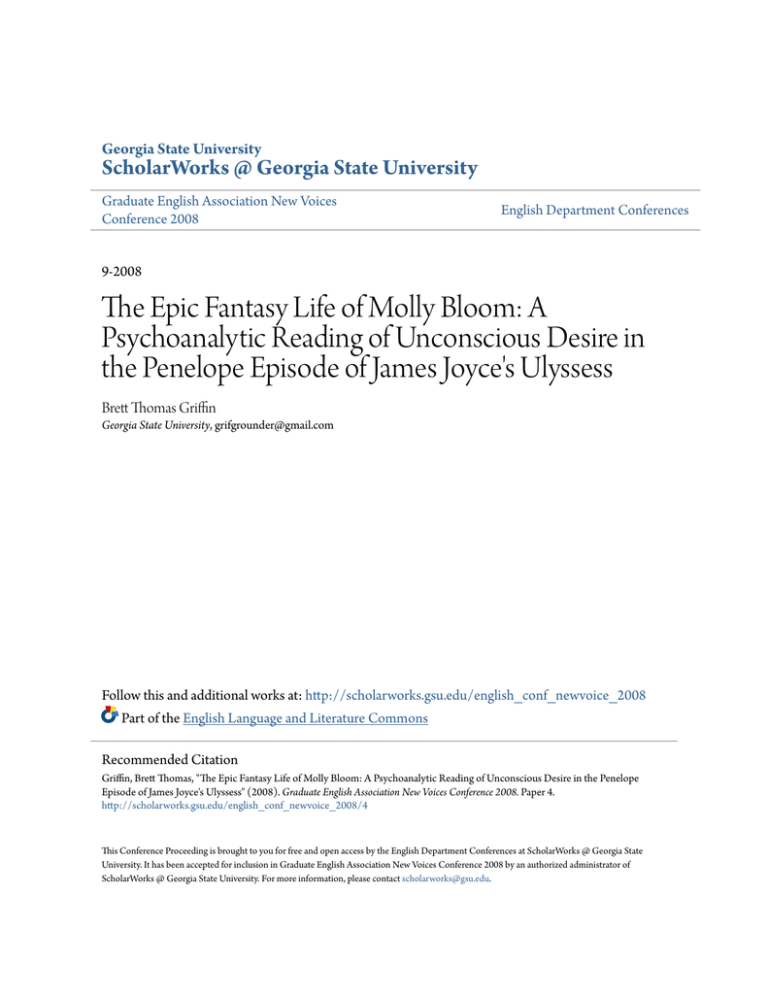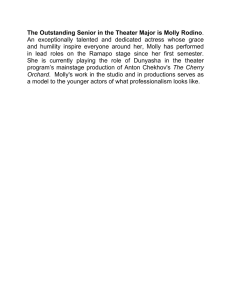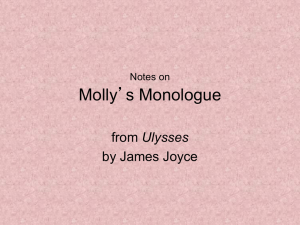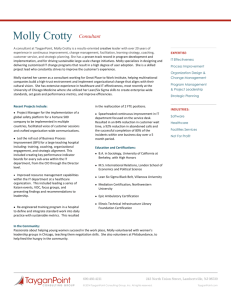The Epic Fantasy Life of Molly Bloom: A Psychoanalytic Reading of
advertisement

Georgia State University ScholarWorks @ Georgia State University Graduate English Association New Voices Conference 2008 English Department Conferences 9-2008 The Epic Fantasy Life of Molly Bloom: A Psychoanalytic Reading of Unconscious Desire in the Penelope Episode of James Joyce's Ulyssess Brett Thomas Griffin Georgia State University, grifgrounder@gmail.com Follow this and additional works at: http://scholarworks.gsu.edu/english_conf_newvoice_2008 Part of the English Language and Literature Commons Recommended Citation Griffin, Brett Thomas, "The Epic Fantasy Life of Molly Bloom: A Psychoanalytic Reading of Unconscious Desire in the Penelope Episode of James Joyce's Ulyssess" (2008). Graduate English Association New Voices Conference 2008. Paper 4. http://scholarworks.gsu.edu/english_conf_newvoice_2008/4 This Conference Proceeding is brought to you for free and open access by the English Department Conferences at ScholarWorks @ Georgia State University. It has been accepted for inclusion in Graduate English Association New Voices Conference 2008 by an authorized administrator of ScholarWorks @ Georgia State University. For more information, please contact scholarworks@gsu.edu. Griffin, Brett Thomas 2008 New Voices Conference September 25-27 Graduate English Association English Department, Georgia State University Atlanta, Georgia The Epic Fantasy Life of Molly Bloom: A Psychoanalytic Reading of Unconscious Desire in the Penelope Episode of James Joyce‟s Ulysses. By Brett Thomas Griffin Presented at New Voices 2008 at Georgia State University ABSTRACT Despite often being mislabeled as a „stream-of-consciousness‟ narrative, recent archival discoveries and theoretical examinations have revealed the Penelope episode of James Joyce‟s Ulysses to be as scrupulously arranged as the rest of the novel. Over the course of the day, Leopold Bloom‟s fantasies recast the Odyssean homecoming as a modern epic. But they represent only half of the story, only half of the conflicted desires that have sundered the Bloom‟s marriage bed. I propose that the unconscious desires that speak Griffin through the fantasy life of Molly Bloom engage in the same Odyssean process of reclaiming and rebuilding the home visible in the fantasies of her husband, and that the telos of this epic restoration centers, for Molly as well as Leopold, on the same fantastic subject: Stephen qua Rudy. 2 Griffin 3 Over the past few decades, Joyce scholarship has seen a proliferation of readings that seek to rehabilitate the good name of Molly Bloom and, for similar reasons, the Penelope episode‟s reputation as an artless narrative. Those who believe Molly has been unjustly impugned must first respond to traditional condemnations of her character that are often the product of a phallocentric mythologizing of woman‟s proper role, behavior, or scope of desires. Other critics have proposed that these same ideological limitations motivate readings of the Penelope episode that either laud or dismiss it as an uninterrupted flow of female discourse, a „stream-of-consciousness‟ untouched by Joyce‟s technique. There is ample evidence to support these emendations, including the discovery by Alyssa J. O‟Brien of a Viconian octagonal edifice underlying the episode‟s eight unpunctuated sentences. Her examination of archival material found that Joyce composed Penelope in nine distinct stages, the results of which produced an episode “scrupulously arranged and highly organized.” Other critics have begun to catalogue the multitude of „Mollys‟ that speak in Penelope, each different voice revealing, among other things, the same subversive attitude towards textual influences and the cultural production of identity that runs through the previous eighteen chapters. With these admirable efforts in mind, I offer my own reading of Penelope that recognizes the episode to be more than a denouement to the actions of June 16th, 1904. I would like to propose that the unconscious desires that speak through the fantasy life of Molly Bloom engage in the same Odyssean process of reclaiming and rebuilding the home visible in the fantasies of her husband, and that the telos of this epic restoration centers, for Molly as well as Leopold, on the same fantastic subject: Stephen qua Rudy. Griffin 4 Among the many threads running through Ulysses, there is an extended discourse on desire‟s manifestation through fantasy that is particularly visible in the thoughts of Leopold Bloom. His troubled relationship with Molly, his own contradictory feelings toward her impending tryst with Blazes Boylan, his voyeuristic and epistolary relationships with different women, and his paternal behavior towards Stephen all speak to conflicting desires that, I believe, center on the loss of his son Rudy ten years before. And while the novel privileges Leopold‟s desires in the previous eighteen chapters, they represent only half of the story, only half of the fissures that have sundered the Bloom‟s marriage bed. Heather Cook Callow‟s recent reassessment of the Penelope episode also proposes that Molly is an active agent in the Odyssean project of restoring the home. Callow emphasizes the remarkable number of congruencies in thought the Bloom‟s share throughout the novel, even going so far as to describe the Bloom‟s as “amateur seducers whose fantasies come from bookstalls and lending libraries” (472). But Callow does not perform a specific analysis of Molly‟s fantasies in Penelope, which is my intent. Only in Penelope do we hear Molly speak her own desire, most visibly in the multitude of fantasies that populate the episode. And the lessons of psychoanalysis teach us that conscious fantasy articulates unconscious desire through moments of denial or negation. What‟s more, these portions of Molly‟s narrative surely partake of the revisionary process visible to Freud in his analyses of patients whose stories were, as Colin MacCabe has paraphrased, “not a reference to a real past event but were fantasies which articulated the conflict in the present” (10). Griffin 5 Molly‟s thoughts of life on Gibraltar present practical examples of unconscious desire‟s capacity to revise both memory and fantasy. In a longer version of this paper, I termed these memories of Gibraltar “retrospective fantasies” precisely because they do not reveal Molly as she was, but rather unconsciously reiterate what Kimberley J. Devlin calls her current “feelings of sexual abandonment and physical confinement as well as her nostalgic desire for romance” (75-6). These retrospective fantasies engage in a twofold process of creation vital to any reconciliatory potential within the novel: the fashioning of an ideal Molly qua sexual subject (versus the novel‟s previous incarnations of Molly qua sexual object), and the metaphorical presentation of the Odyssean suitors, introduced so that they may be slaughtered. One function of Molly‟s revised memories of past lovers is to provide more fodder for the bloody homecoming. Similarly, I found that grouping Molly‟s fantasies into somewhat artificial categories further revealed desire‟s capacity to reshape the past and future in the present. Though by no means mutually exclusive, I described them as fantasies of sexual fulfillment, fantasies of recompense, and fantasies of confrontation. As much as I would enjoy cataloguing these and their subtle variations for you, I would like to move directly into an analysis of what is, I contend, the culmination of Molly‟s fantasy life, the „grand fantasy‟ of the eighth sentence in which these separate strands interweave and articulate most forcefully her unconscious desire. But this crescendo begins, pianissimo, back in the seventh sentence. The moment at which the potential satisfaction of Molly‟s unconscious desire (and the restoration of the Bloom home) first appears, like so much of unconscious speech, in a collection of statements ostensibly about the opposite, and is worth careful Griffin 6 examination. Tellingly, the seventh sentence opens with Molly thinking of her womb: “who knows is there anything the matter with my insides or have I something growing in me” (Joyce 770). The simplest way to fill the psychic hollow left by the death of Rudy would be to physically fill her womb with new life. But death has taken more from the Bloom‟s than Rudy alone. Her train of thought then leaps from menstruation, to the pleasure of a flushing toilet, and back to the early days of her romance with Leopold when his letters had her “always at myself 4 or 5 times a day sometimes” (Joyce 771). These pleasant thoughts are interrupted by his kicking feet, which lead her to toy with the idea of exposing “that French letter still in his pocketbook” and pontificate on “the kind of villainy [men are] always dreaming about” (Joyce 772). She then begins to describe Leopold‟s ineffectual efforts at oral stimulation, a mode of sexual satisfaction, I might point out, that cannot impregnate. Crucially, at this exact moment, her fantasy of punishing Leopold for his ineptitude is interrupted by death. Molly‟s ruminations on Leopold‟s inability to satisfy her intertwine with memories of him mourning his father, “he slept on the floor half the night naked the way the jews used when somebody dies belonged to them” (Joyce 773). This in turn leads to a fantasy of punishment, “Ill make him do it again if he doesn‟t mind himself and lock him down in the coalcellar with the blackbeetles,” and tails into one of the episode‟s many admissions that Leopold “wants me and Boylan” to consummate the affair (Joyce 773). In between these lines, Molly claims that Leopold does not have the courage to do just as she has done, namely, consummate a fantasy. Referring to the letter she spied earlier in the morning, Molly wonders if it might be from a dismissed servant, “was it her Josie off her head with my castoffs hes such a born liar too no hed never have the courage” (Joyce Griffin 7 773). We begin to approach a plan for restoration of the home, but her attack on Leopold‟s “courage” illustrates her own internalization of the Other‟s demand that the hero be someone other than herself. If the gendered metaphor can be forgiven, Molly also desires that Leopold man up. The crucial observation here is not that a female character from the early twentieth century is in need of saving. Instead, I would again point this parting shot‟s immediate narrative lead-in: Just like Leopold, who is physically and psychically incapable of sexual intercourse since Rudy‟s death a decade before, Molly associates sex and death – its specter haunts the Bloom marriage bed. Or look where Molly first introduces (and simultaneously defangs) Leopold‟s fantasies. On the second page of Penelope, she comically points out Leopold‟s inability to hide the epistolary affair; she stumbles upon him “scribbling something a letter” while she enters “the front room for the matches to show him Dignams death in the paper” (Joyce 739). She goes on to speculate that the letter is from “somebody who thinks she has a softy in him,” which, punning on Leopold‟s spiritual and physical impotence, is exactly the problem (Joyce 739). To return to seventh sentence, this is where Stephen enters, for the second time, the Bloom household. She first thinks of Stephen as the ideal poet who will immortalize her beauty in verse; but, like many of the fantasies encountered earlier, this is a convention, one of the Symbolic order‟s prepackaged satisfactions, and, I suspect, not what she wants from Stephen anyway. Molly then fantasizes about being recognized by Stephen as an object of desire, and subsequently recognized by an offended public as an object of scorn; but this language is also familiar, sounding very much like her earlier Griffin 8 fantasy of being caught as Blaze‟s mistress. Here, Stephen presents a more appealing and refined source of the gaze, but is still not that which will satisfy Molly‟s unconscious desire. Stephen remains that which will fulfill the desire of the Other. But, Molly‟s unconscious desire – the return of Rudy – begins to unveil itself explicitly just after the introduction of Stephen to Molly‟s sexual fantasies, and draws strength from the inextricable link between sex and death. I believe this helps explain the anonymity and extremity that colors the late fantasies of the eighth sentence. Witness the progression, from ruminations on her continued virility – “I cant help it if Im young still can” – in contrast to all those jealous women she can‟t seem to forget – “it‟s a wonder Im not an old shriveled hag before my time” – to the cold husband who will no longer touch her – “living with him so cold never embracing me sometimes when hes asleep the wrong end of me not knowing.” These specific complaints contrast her abstract and idealized paramours, moving from the romantic stereotype of a uniformed yet nameless sailor, to the Gothic danger a gypsy, to the fantasy of being with an honest-to-god “murderer” (Joyce 777). Again, crucially, it is immediately following this sequence that we hear Molly‟s most extended cry of grief for her lost son Rudy, yet only the briefest sketch of the consequences wrought by his death upon the Bloom home. Very quietly, she says it was “our 1st death too it was we were never the same since” (Joyce 778). Molly‟s desire reaches its textual apex in the cluster of ambiguous pronouns, symbols and anxieties that populate what I will again call the „grand fantasy‟ of sentence eight. In this burst of rough language, Molly conflates Leopold, Stephen, Blazes and Rudy, and touches on the myriad themes that swirl just beneath the surface of the entire episode – sex and death, aging and the loss of virility, nurturing and rejection, Griffin 9 confrontation and acceptance, guilt and punishment, marriage and infidelity, the lifegiving substance and a cold bed: Ill throw him up his eggs and tea in the moustachecup she gave him to make his mouth bigger I suppose hed like my nice cream too I know what Ill do Ill go about rather gay not too much singing a bit now and then mi fa pieta Masetto then Ill start dressing myself to go out presto non son piu forte Ill put on my best shift and drawers let him have a good eyeful out of that to make his micky stand for him Ill let him know if that‟s what he wanted that his wife is fucked yes and damn well fucked too up to my neck nearly not by him 5 or 6 times handrunning theres the mark of his spunk on the clean sheet I wouldn‟t bother to even iron it out that ought to satisfy him if you don‟t believe me feel my belly unless I made him stand there and put him into me do it in front of me serve him right its all his own fault if I am an adulteress.... (Joyce 780) Here, a solution is proposed that will, in a sense, force Leopold‟s hand, both to expel the suitors and restore life to the house. In this long digression we see Stephen cared for as a (or the lost) child; but, as we know from the Ithaca episode, Leopold has already shared Molly‟s cream with Stephen. The touch on the belly, font of life and of Rudy, barren since his death, speaks to that which thwarts the Bloom‟s shared unconscious desire. Her talk in these pages of wasted “omission” and visible “spunk” speaks to her unconscious desire that it (or Leopold) return to its (or his) proper place. Once the suitors are expelled, Penelope must be reconciled to Odysseus through the sexual act, the very act Molly has not experienced with Leopold for over ten years. In contrast, the final pages return to Leopold and Molly‟s first days, when everything was possible, when the marriage bed was the site of affirmation rather than negation. She thinks of how Leopold is different, is, in fact, the hero who can restore their home. Leopold can because “he understood or felt what a woman is” – perhaps not all women, but at least the one who counts (Joyce 782). There is a tendency in traditional readings of Molly to universalize, as Hugh Kenner does when he sees Molly‟s use of an Griffin 10 ambiguous “him” as the “coalescence of all particular things, and of all men” (99). Instead, I believe Molly‟s fantasies reveal the singularity of possible heroes, the multiplicity of „hims‟ the product of a specific anxiety regarding one „him‟ – Rudy. The anonymity of fantasy partially shields Molly from the unbearable, that Rudy is not coming back, yet only one remains that may restore the marriage bed – Molly waits for Leopold and Leopold alone. Her fantasies speak to this core anxiety, Rudy‟s death, and, like the inexorable gravity drawing Leopold towards Stephen throughout the day, propose to fill this hole in the Bloom‟s life with a surrogate, once again Stephen, thereby restoring the marriage bed. Strangely, I find myself in partial agreement with Lisa Sternlieb that “Joyce‟s radical form of writing [is] a conservative gesture, one which weaves and unweaves language in order to preserve marriage,” though I would argue that he roots for this particularly idiosyncratic marriage, and not necessarily marriage as an institution (759). For this shared fantasy, and the manner in which it manifests itself, would make a dangerous prescription for any couple but the Blooms. Finally, to add my voice to that rehabilitative chorus mentioned at the outset, I would like to add that Molly is a complicated character whose contradictory fantasies, while containing the socialized subject‟s necessary submission to the Other, retain their capacity to expose the processes that would naturalize the subject‟s interpolation into culture, to illuminate what Callow calls the “alternate voices and coexisting alternate realities” that shape us all (475). I agree with Colin MacCabe that Molly‟s repeated articulation of “female desire” represents a unique voice in literature, and that Ulysses is one of the first modernist texts to let speak “a voice that will not be reduced to sense and a body that will not be reduced to lack” (132). But the reality is that no voice, no matter Griffin 11 how articulate or brave, can fill the fundamental gap between language and desire that precipitates fantasy. Perhaps this is the “reflection of unfathomable mystery” Friar Robert Boyle saw as productive of “[t]he uncertainty” so typical of critical reactions to Penelope (408). Molly‟s fantasies are much deeper and more revealing than wistful nocturnal musings. Indeed, Molly‟s fantasies present the third subject necessary for proper consummation of a both Oedipal and Odyssean drama, and further reveal those unconscious desires that must be fulfilled or subsumed to restore the Bloom household to a normative stability. Both Leopold and Molly engage in elaborate fantasies in order to “ward off lack;” and both hope to fill this lack with the same fantastic subject – Stephen qua Rudy. I believe Molly‟s fantasies, and the narrative of Penelope as a whole, reiterate Joyce‟s immense project in Ulysses to sound the many and often contradictory desires that coalesce into all modern selves, and take solace in the affirmative moment prior to loss the closes Molly‟s speech – the proposal on Howth and the novel‟s final “Yes.” Griffin 12 WORKS CITED Boyle, Fr. Robert, S. J. “Penelope.” James Joyce‟s Ulysses: Critical Essays. Eds. Clive Hart and David Hyman. Berkley: U of California P, 1974. 407-33. Callow, Heather Cook. “ „Marion of the Bountiful Bosoms‟: Molly Bloom and the Nightmare of History.” Twentieth Century Literature 36.4 (Winter 1990): 464-76. Devlin, Kimberley J. “Pretending in „Penelope‟: Masquerade, Mimicry, and Molly Bloom.” Novel: A Forum on Fiction 25.1 (Fall 1991): 71-89. Gilbert, Stuart. James Joyce‟s Ulysses. New York: Vintage, 1958. Joyce, James. Ulysses. New York: Vintage, 1990. Kenner, Hugh. Joyce‟s Voices. Berkley: U of California P, 1978. MacCabe, Colin. James Joyce and the Revolution of the Word. 2nd ed. New York: Palgrave, 2003. O‟ Brien, Alyssa J. “The Molly Blooms of Penelope: Reading Joyce Archivally.” Journal of Modern Literature 24.1 (Fall 2000): 7-24. Sternlieb, Lisa. “Molly Bloom: Acting Natural.” ELH 65.3 (Fall 1998): 757-78.




